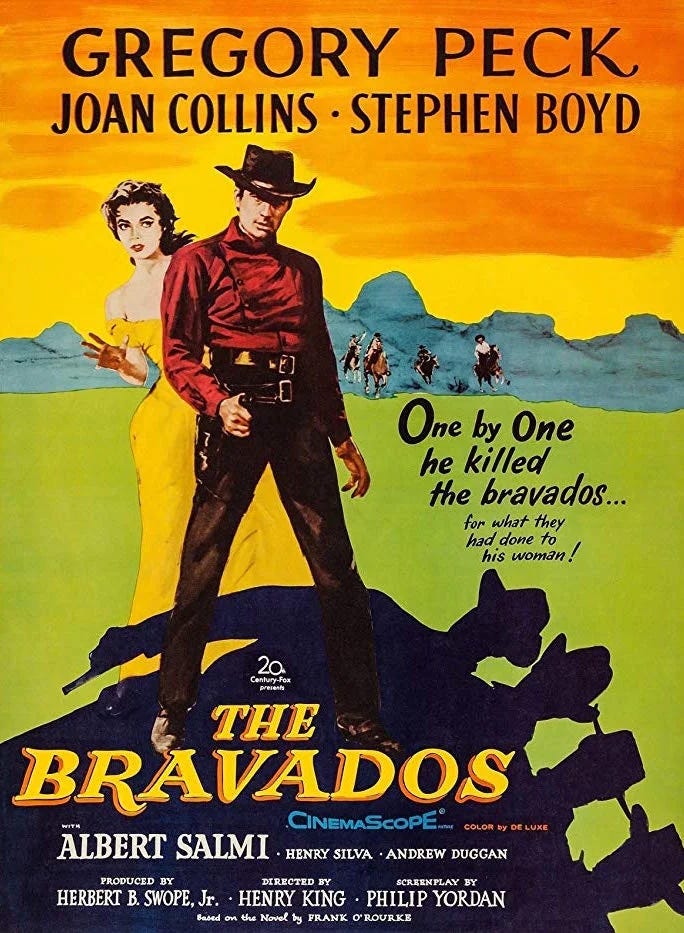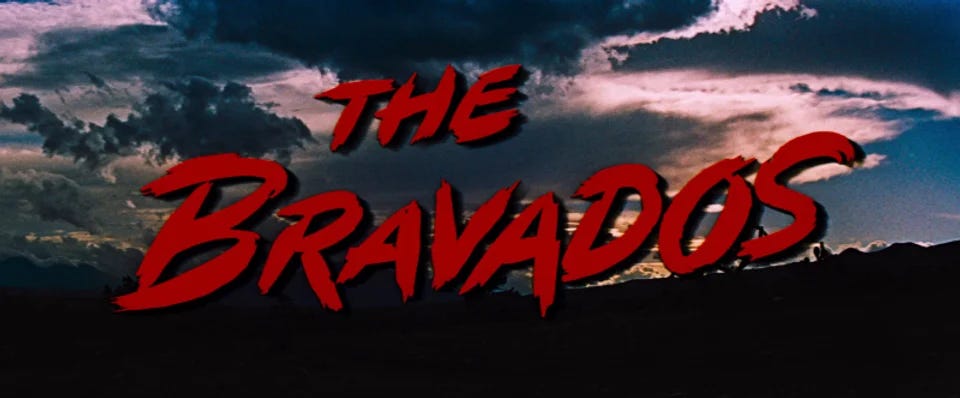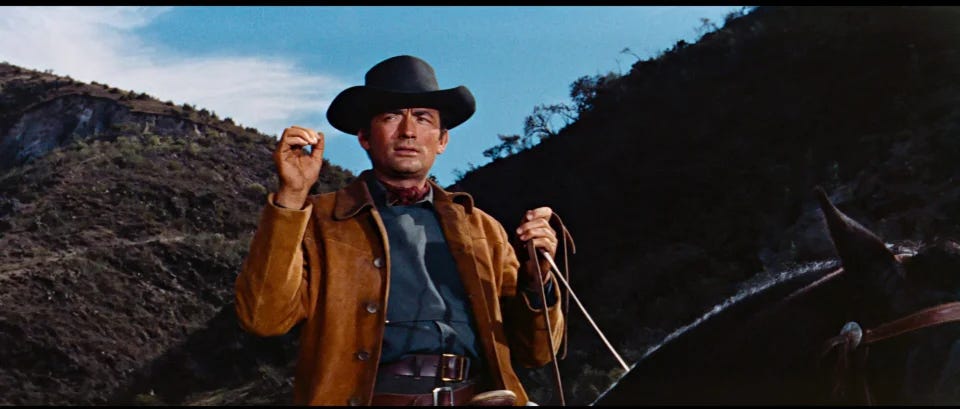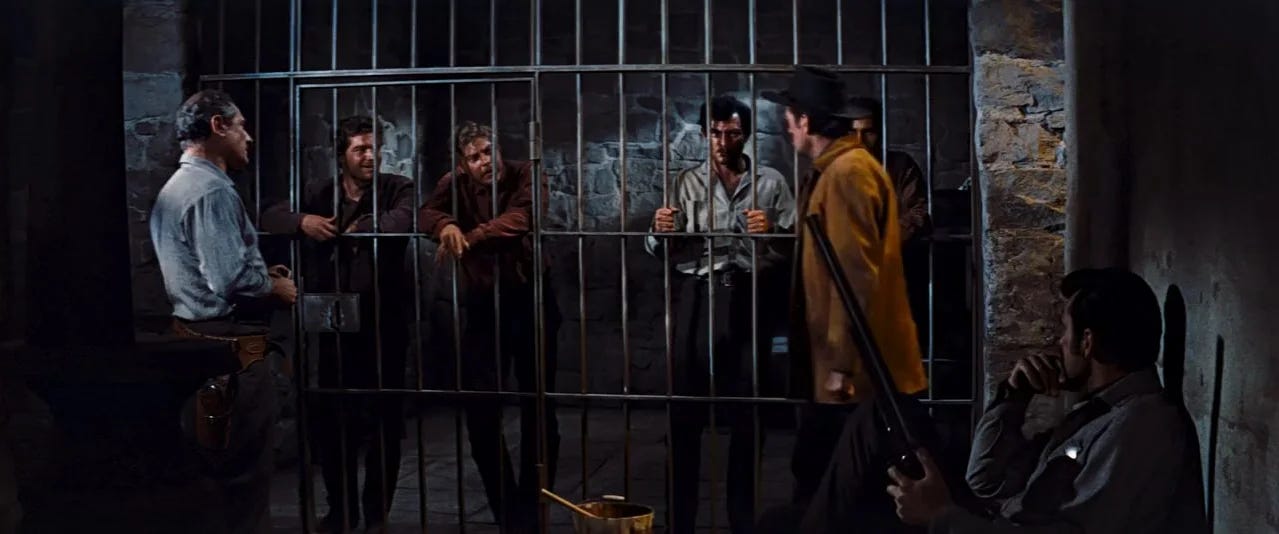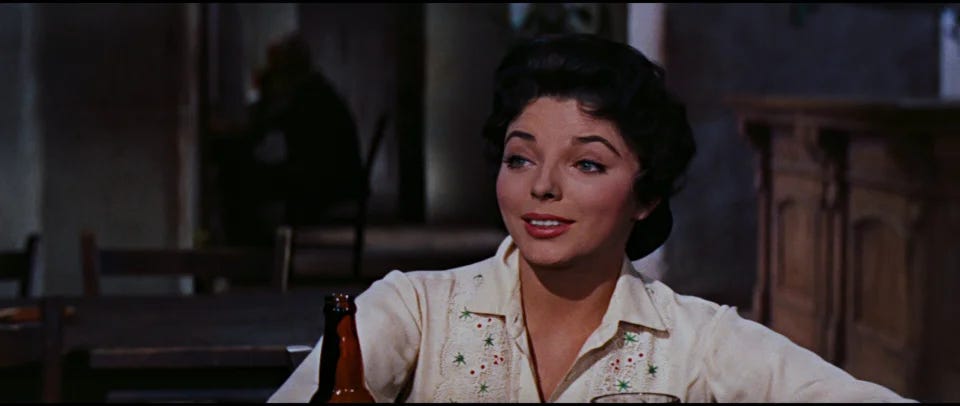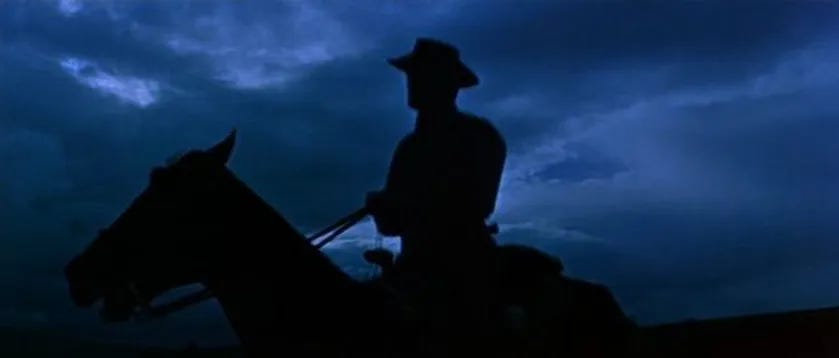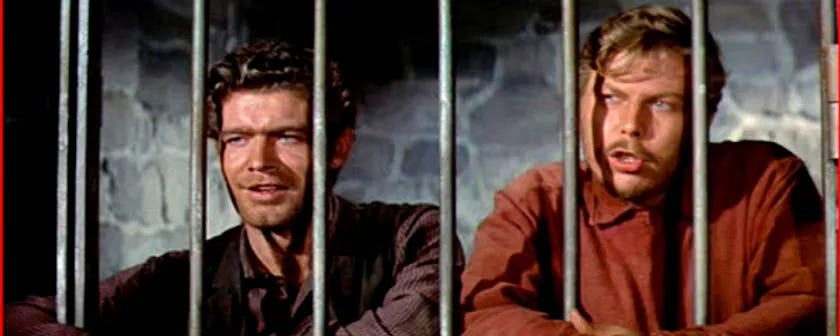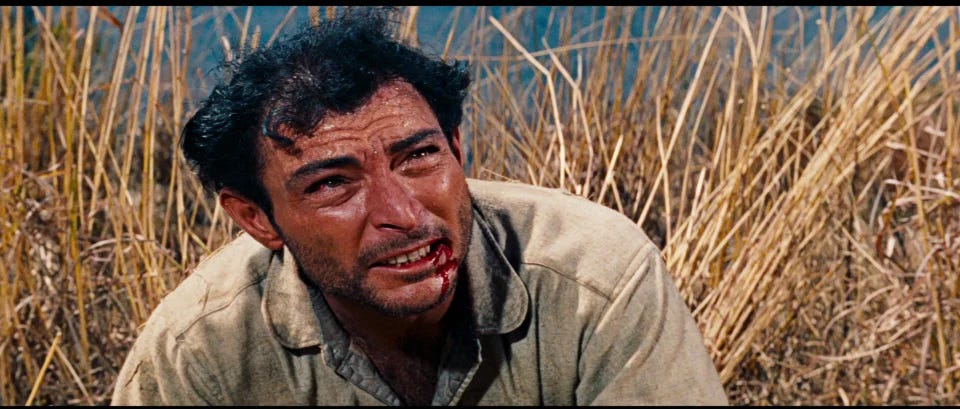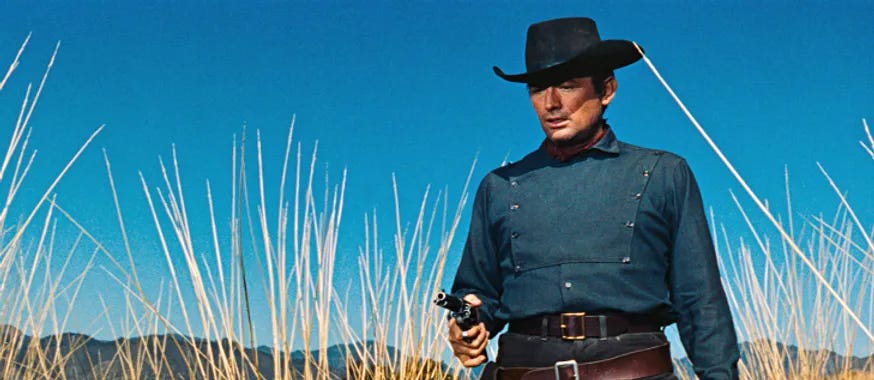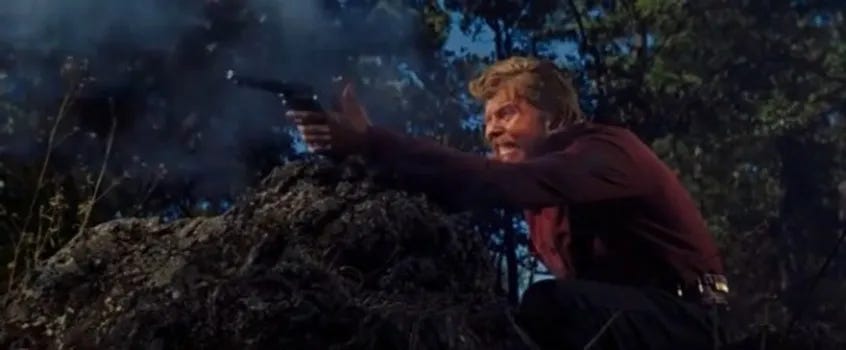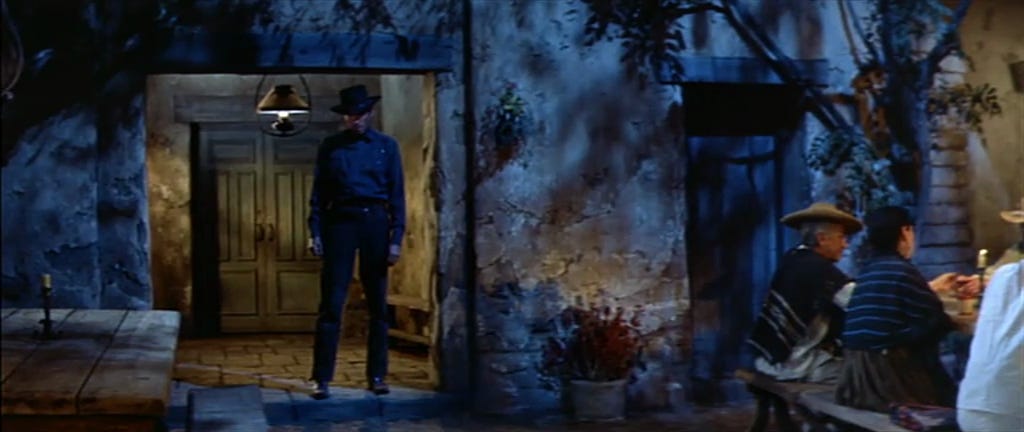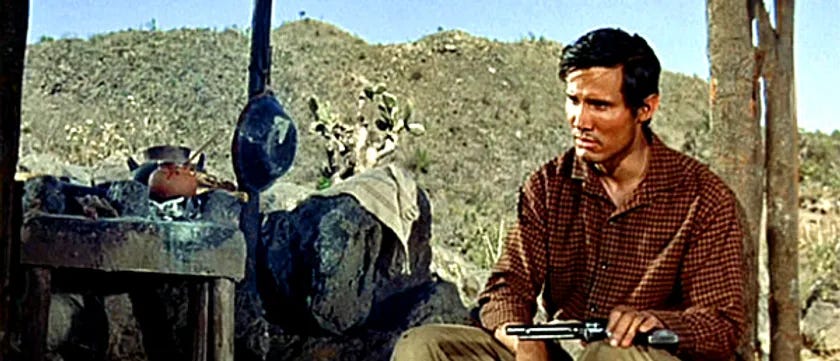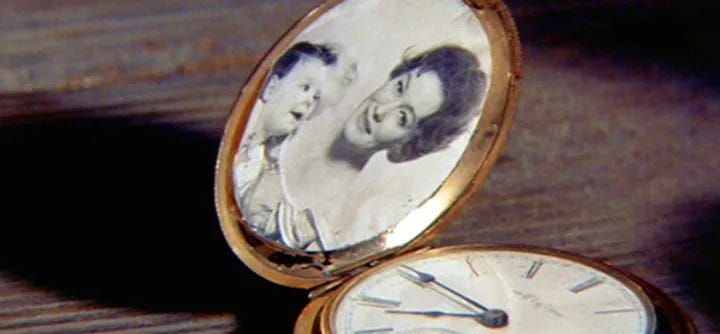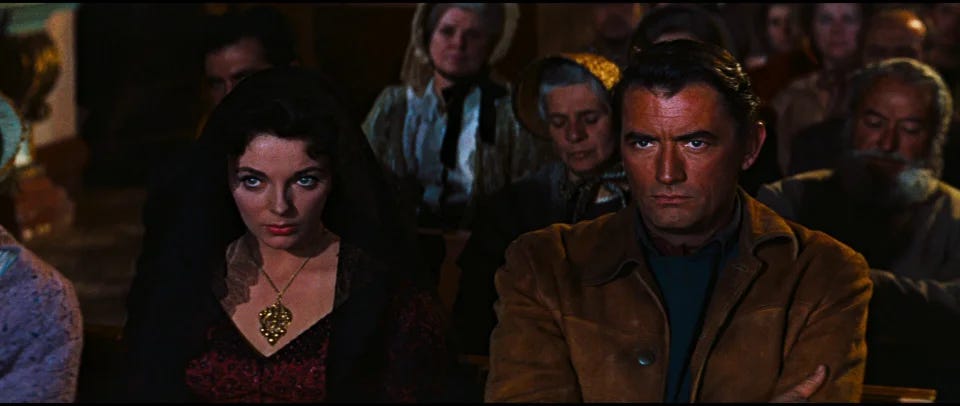Darkness, Revenge, and Redemption in The Bravados (1958)
“I’ve ridden a hundred miles to see this hanging.”
These are not the first words we hear from Jim Douglas1 (Gregory Peck), first seen approaching the town of Rio Arriba alone on horseback. No, those are not his opening words, but they are his first words of any significance. Stopped by a sentry posted just outside the town, Douglas quickly determines he won’t be able to do whatever it is he came to do without the oversight of local law enforcement. It soon becomes clear that everyone in Rio Arriba thinks this stranger is a different visitor from the one they’ve been expecting. There’s a sense of relief, almost jubilation over Douglas’s arrival until the townspeople discover the truth: He’s not the hangman sent to permanently rid the town of four criminals being held in the local jail for a fatal bank robbery. But if he’s not the hangman, then who is Douglas?
The noir elements - both thematically and visually - run throughout The Bravados, but in ways we might not expect. Although the film’s opening shows Douglas approaching the town in blazing sunlight, once he rides his horse through its streets, the buildings and large trees engulf him in deep shadows, providing the first of many such moments that convey the darkness of the character. Yet the film has more in mind than this, as we will see in its unique handling of morality and spiritual themes.
Douglas finds Rio Arriba, a town dedicated to justice, a community with a strong sheriff (Herbert Rudley), and a populace urgently desiring to see criminals punished. Rio Arriba is something of an oddity in westerns. The buildings, tree-lined streets, the lovingly-maintained Catholic church (which everyone seems to attend), and the locals portray a township with more depth and character than the usual stereotypes we normally see in the genre. But this community also has a vengeful streak, indicating that they’re not as upstanding as we might think. One of the townspeople, believing Douglas to be the executioner, urges him to “Hang ‘em slow.” But Douglas simply wants to see the condemned prisoners.
He does, but there’s not much of a verbal exchange: Douglas glares at the men, they glare at him. In fact, all four of them - Alfonso (Lee Van Cleef), Bill Zachary (Stephen Boyd), Ed Taylor (Albert Salmi), and Lujan (Henry Silva) - seem quite complacent, even with the gallows visibly under construction right outside their cell.
Earlier in the film, Douglas runs into Josefa Velarde (Joan Collins), a woman he fell in love with several years previously. Douglas discovers that Josefa came to Rio Arriba to look after her late father’s ranch and stayed on, never marrying. Josefa learns that Douglas did marry, but is now a widower with a young daughter. But Douglas doesn’t tell her everything. He saves that for the town priest (Andrew Duggan), informing him that his wife was raped and murdered by a gang of four men. The question is, are these the same four men waiting to hang in the morning?
In the night scene before the hanging, cinematographer Leon Shamroy floods the streets with a deep, otherworldly blue, almost wrapping the entire town with a shade so rich and pervasive you’d think you were several fathoms deep in a vast ocean. Darkness is certainly approaching in more ways than one, but then an interesting thing happens which will be reprised later in the film: Douglas is seen from inside his hotel room, looking out onto the streets below. The deep blue surrounds the area outside the window, yet Douglas and his room are bathed in an intense yellow, almost like a fire burning from within. Without trying to be too interpretative, it’s a striking image contrasting the town and the inner vengeance awakening in Douglas. His seething is more pronounced at the town’s church service, where he listens as the the priest urges his congregants to pray for the salvation of the men who’ll be hanged tomorrow. Prayer will play an essential part in the remainder of the film, but the look on his face tells us Douglas isn’t buying any of it.
I’m not going to tell you how it happens (you can probably guess), but the four criminals escape, and, to no one’s surprise, Douglas soon takes charge of the posse that sets out to recapture the men.
SPOILERS FOLLOW
When he catches up to the first criminal, Alfonso, Douglas goes through a routine we will see repeated. Holding Alfonso at gunpoint, Douglas shows him his pocket watch containing a photograph of his wife and child, asking if he recognizes the women. Alfonso says that he doesn’t, but this isn’t just a simple denial. The man is shaking on his hands and knees, begging for his life (something I can’t remember ever seeing from a Lee Van Cleef character). Douglas initially seems uncertain, either at how to further interrogate Alfonso, or whether he should just go ahead and kill him. Yet even after Alfonso pleads, “I’ve got a wife and baby too,” Douglas barely hesitates at all, shooting Alfonso dead. (Interestingly, Alfonso’s final words are, “Holy mother,” reminding us of the priest’s prayer from the night before.)
At this point we see little remorse or regret on the face of Douglas. He believes that too many elements have lined up in his favor, that these four are the men he’s seeking. He feels legitimate cause despite Alfonso’s pleas for mercy. This is, after all, a criminal who’ll lie through his teeth to save himself. (And in the audience’s mind, this is Lee Van Cleef, who almost always plays a bad guy guilty of every accusation that’s thrown his way and many more that aren’t.) Douglas’s conscience is justified, harboring no doubts that he’s killed one of the men who raped and murdered his wife. You can almost see the confidence emerging on his face, sort of a “One down, three to go” tally going on inside his head. And it’s on to the next criminal.
In the meantime Taylor, Zachary, and Lujan - along with Emma (Kathleen Gallant), the kidnapped daughter of a local merchant - continue to evade the posse. During a shootout with Douglas, Zachary and Lujan make off with Emma, leaving Taylor to dispose of Douglas. But Taylor is too quick and too wild with his gun, missing Douglas and quickly running out of bullets. After Douglas lassos Taylor and strings him up upside down with no words exchanged. Douglas is so convinced he has the right men that there’s either no need to question Taylor, or (more likely) no time, since Zachary and Lujan already have a significant head start. Had that not been the case, Douglas would probably have gone through the same line of questioning with Taylor that he did with Alfonso (and would eventually repeat the routine with both Zachary and Lujan).
Crossing the Mexican border, Douglas finds Zachary at a cantina drinking with a woman. Here we see Douglas framed in the same manner we saw in the hotel room, standing in a yellow doorway surrounded by deep blue walls. His interrogation of Zachary is remarkably trimmed down. Douglas pulls out his watch with the picture of his wife and child, lays it on the table, and simply says, “The picture.” Zachary denies knowing anything about the woman, but his arrogant manner - quite different from that of Alfonso - tells Douglas everything he needs to know, and Zachary’s death comes quickly.
Douglas finds Lujan’s house, but Lujan is gone, leaving only his wife (Alicia del Lago) and child at home. While Douglas is distracted looking outside for Lujan, Lujan’s wife knocks Douglas unconscious with a water jug. Douglas awakens to find himself completely vulnerable, sitting on the porch at the wrong end of Lujan’s gun. For once, Douglas is forced to make his case from a position of weakness. Lujan asks, “Why do you hunt me?” Seeing the picture Douglas hands him, Lujan responds, “Your wife and baby? They are pretty.” Lujan nods to his own wife and child, now joining them on the porch. “My wife and baby. They are pretty.” It’s almost as if this recognition carries a sense of equality. Both men have (or had) a wife and child they love(d). They are, in that respect (and perhaps others), equal.
Many things are conveyed in this exchange. First, Douglas realizes that Lujan’s wife and child are just as precious to the man as Douglas’s were to him, as mentioned above. The scene also suggests the idea of spiritual equality, heightened by the importance and centrality of the Rio Arriba church, that all men are under the eyes of God, an important point as we approach the film’s conclusion. Lujan has no hatred for Douglas, who has done him no harm, other than being part of a posse sent to track the four men down for a crime they did legitimately commit. But that’s not what this is about. Now understanding Douglas’s real purpose in finding him, and knowing he is not guilty of that charge, Lujan has no reason to harbor any hatred toward Douglas. And Douglas, putting two and two together from what Lujan has told him of the quartet’s journey to this point, realizes he was betrayed by his friend and neighbor Butler (Gene Evans). “Oh God, dear God,” Douglas mutters.
All of Douglas’s vengeance is gone with no object on which to unleash its fury. (Butler was killed by Zachary as he and Lujan, still carrying Emma, sought food and fresh horses at Butler’s cabin.) There’s no longer anyone to punish for the rape and death of his wife, but now there are three deaths charged to Douglas’s account.
Here we get into some murky moral waters. We’re not sure exactly who was responsible for the deaths that occurred during the bank robbery, which takes place before the film starts. Perhaps one of the four criminals, perhaps all of them. While incarcerated, none of the four deny responsibility for the death(s) in the bank. Since all four are complicit and thus deserving death, we could say that they were going to die anyway, either at the end of a rope or at the point of Douglas’s gun. But Douglas finds no comfort in that (yet the townspeople, unaware of the real story, do). Although the four men are not innocent of the bank robbery and its related deaths, they are innocent of the rape and death of Mrs. Douglas. And Douglas has three of their deaths on his conscience.
Would Lujan have killed Douglas if the situation had been reversed? Almost certainly. Would Douglas have killed Lujan if Lujan’s wife hadn’t knocked Douglas out? Probably. Further, with Butler dead, Douglas would’ve gone the rest of his life thinking that he had avenged his wife’s rape and death. He would have felt justified. But things didn’t play out that way. Douglas now knows the truth, and his life will never be the same.
This leads to the film’s conclusion, which is not only an atypical Hollywood ending, it also contains significant spiritual depth rarely found in a non-religious movie (and is far better than most of those). Whether out of a sense of desperation for his wrongs or because he was treated well there previously, Douglas again enters the Rio Arriba church, where the padre climbs down (perhaps significantly) from working on one of the stained glass panels to meet with him. All of the scenes in the church share a hue of yellow that reminds us of Douglas’s burning desire for revenge, images I’ve mentioned earlier. Yet here, although the color covers a broader area, it’s more subdued, controlled. It’s the illumination of warmth rather than anger or unfulfilled retribution.
“Father,” Douglas confesses, “I need help.”
“We all do,” answers the priest.
“I killed them for revenge, for something they didn’t do,” Douglas says. “I was wrong…wrong…”
The priest tries to comfort Douglas, telling that he hasn’t tried to excuse his actions. Even more, the very fact that what he’s done disturbs him separates him from others who’ve also killed, possibly even for revenge. But the priest’s words bring Douglas little comfort. Douglas knows that comparing himself to others who’ve committed the same sin isn’t the answer. Douglas holds himself to a higher standard, one he knows he can’t attain. The priest’s final words of comfort, “Some people think prayers help,” seem like a platitude, but perhaps they’re not.
As Douglas emerges from the church to face a grateful, welcoming crowd, the sheriff, representing the townspeople, says to Douglas, “You’ll be in our hearts always.” Before he departs, Douglas, adds, perhaps remembering the words of the priest. “And in your prayers, please…”
Some critics have suggested that the ending is both disappointing and unjust in that Douglas walks away scot free with no consequences. I disagree. Douglas is still devastated over what he has done and probably will be as long as he lives. We don’t know that Douglas is going to heal spiritually, but he seems to embrace the fact that the priest’s words could be true. Many people who don’t even believe in God will at least accept the prayers of others on their behalf. This may be the case with Douglas. We don’t know what happens to Douglas after this. (It’s a movie, after all. You watch it, you leave the theater, and you forget about it. Unless you think about movies like you and I do.) Yet we know Douglas has a moral conscience. He’ll always remember the difference between righteous anger and revenge. He’ll make sure he has all the facts in the future, not just in situations as serious as this, but probably in every aspect of life. And perhaps he will understand that prayers can help provide healing.
I’ve seen both spellings, Douglas (TCM and most articles, including the Twilight Time booklet notes) and Douglass (IMDb), in my research, but have chosen to use “Douglas” for this review.


